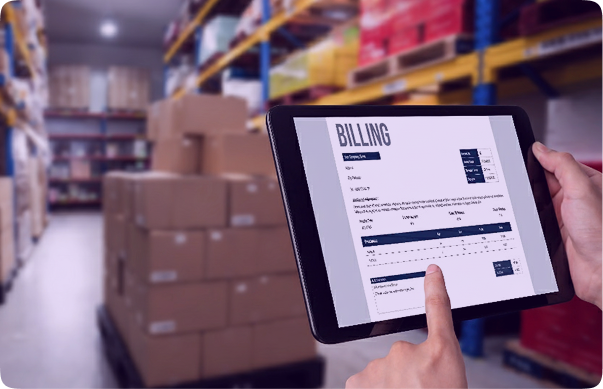Logistics billing often feels like a game of hide-and-seek. You agree on a base freight rate, but the final invoice tells a different story, layered with extra fees that quietly eat into your budget. These aren’t random surprises; they’re accessorial charges—legitimate costs for services that fall outside the standard pickup-and-delivery model. These may include fuel surcharges, detention fees, residential delivery costs, or liftgate at a location without a dock.
As supply chains grow more global and customer expectations soar, the need for accurate cost visibility has become essential for maintaining profitability and operational trust. Yet, many businesses still struggle to identify, track, and forecast these variable expenses.
The result? Missed savings, unexpected charges, and strained partnerships. Understanding what accessorial charges are and how to manage them effectively is the first step toward smarter logistics planning, transparent billing, and sustainable cost control.
What Are Accessorial Charges?
Accessorial charges are additional fees applied to freight shipments for services beyond standard pickup and delivery. These charges account for the extra time, labor, or equipment needed during transport. They vary based on shipment type, carrier policies, and customer requirements, making them a critical yet often overlooked component of total freight spend.
Common Examples Include:
- Fuel Surcharge: Covers fluctuating fuel costs that impact carrier operations.
- Liftgate Fee: Charged when deliveries are made to locations without loading docks
- Detention Fee: Applies when drivers wait longer than the allowed loading/unloading time.
- Reconsignment Fee: For changes in delivery destinations mid-transit.
- Residential or Inside Delivery: When shipments are delivered to non-commercial or hard-to-access locations.
Why It Matters:
Accessorial charges represent the true cost of transportation. Understanding them improves billing accuracy, supports budget forecasting, and strengthens carrier relationships through transparent cost management.
Why Accessorial Charges Are Crucial
- Reflect True Transportation Costs:
Accessorial charges represent the real cost of moving goods, covering services beyond standard line-haul rates such as loading, storage, or special equipment use. - Impact Profitability:
Untracked or unmanaged accessorial charges can silently consume up to 15–20% of total logistics costs. Over time, these unnoticed expenses directly erode profit margins, especially for high-volume shippers handling thousands of invoices monthly. - Influence Carrier Negotiations:
Accessorial data provides valuable insight into recurring issues such as frequent detention at specific locations. A clear understanding of recurring accessorial fees provides leverage in carrier discussions and helps identify areas where service terms or operations can be improved. - Ensure Transparent Billing:
When accessorials are clearly defined and recorded, disputes between shippers and carriers drop significantly. Recording accessorials promotes billing accuracy, reduces disputes, and builds stronger trust between shippers, carriers, and clients. - Enable Strategic Decision-Making:
Accessorial data reveals hidden patterns. Identifying frequent accessorials helps uncover bottlenecks. This data-driven insight enables strategic improvements in logistics efficiency and customer service.
Where Accessorial Charges Appear
Accessorial charges are scattered across multiple documents and systems, making them easy to overlook without automation.
- Freight Invoices & Bills of Lading:
These are the most common sources. Accessorial charges are typically listed on shipment invoices or Bills of Lading, outlining extra costs like detention, fuel surcharges, or special delivery services. - Tariff Schedules:
Tariff schedules include the standard carrier-defined rates and applicable service fee for accessorial services such as storage, redelivery, detention, or reconsignment. - Rate Contracts & Shipping Confirmations:
Many carrier agreements explicitly define when and how accessorial charges apply, based on shipment weight, location type, or delivery timing. However, these clauses are often buried deep within long documents, requiring careful review. - Scattered Terminology:
Depending on the carrier, accessorials may be labeled differently or placed in separate sections, making them easy to overlook without careful review. A major challenge lies in inconsistent labelling such as “wait time” might mean detention for one carrier and delay fee for another.

Challenges in Manually Identifying and Mapping Accessorial Charges
Inconsistent Terminology Across Carriers
Each carrier has its own naming conventions. One might label a charge “driver detention” while other calls it “idle time.” Such inconsistency makes it difficult to standardize or compare costs, leading to confusion during invoice audits.
Hidden or Bundled Charges in Invoice Line Items
Accessorials are often merged with base freight charges or listed ambiguously within invoices. Teams must manually separate and interpret each cost component, increasing the risk of missed or misclassified expenses. This lack of clarity often results in missed or misclassified charges.
Multiple Formats: PDF, Scanned, Handwritten
Invoices arrive in varying formats—digital, scanned, or even handwritten, making data extraction tedious and prone to human error. Manual data entry from such unstructured documents is prone to human error and slows down processing cycles.
Time-Consuming Validations and Risk of Oversight
Manual reviews require extensive time and attention. Human reviewers must cross-check each invoice line by line, matching rates to contracts and verifying each charge. This manual effort drains productivity, especially when managing thousands of shipments monthly.
Missed Charges Leading to Revenue Leakage or Overpayments
Even small oversights such as unrecognized fuel surcharge can accumulate into significant losses over time. Misread or missed charges cause revenue leakage, overpayments, or unclaimed recoveries, weakening overall financial control.

How AI Helps in Extraction and Mapping
Artificial Intelligence is transforming the way logistics teams identify, categorize, and manage accessorial charges. Traditional manual methods struggle with inconsistencies, unstructured data, and time constraints, but AI-powered tools bridge these gaps with speed, precision, and scalability.
AI-Powered OCR and NLP for Data Recognition
Using OCR and NLP, AI systems can read invoices, bills of lading, and rate sheets in any formats whether scanned, handwritten, or digital. These technologies automatically recognize text patterns and extract relevant information, even when carriers use different naming conventions for similar services like “detention,” “wait time,” or “delay fee.”
Automated Mapping into Standardized Categories
Once identified, AI maps charges into consistent categories across all carriers. Whether it’s labeled as “delay fee” or “driver detention,” the system groups them under a unified category. This eliminates ambiguity, making it easier to analyze, report, and compare costs.
Scalable, High-Volume Processing
Another major advantage is the ability to process large data volumes with high accuracy. AI can handle thousands of invoices in minutes with near-perfect accuracy, minimizing human error while improving overall efficiency.
Seamless Integration with Existing Systems
Finally, AI integrates seamlessly with existing financial, ERP, and logistics systems, ensuring smooth data flow across departments. This ensures data flows smoothly across departments such as finance, operations, and procurement, providing a unified, real-time view of all logistics costs.
Continuous Learning and Improvement
AI systems improve over time. With every processed document, they refine pattern recognition and enhance accuracy, adapting to carrier-specific terms and evolving rate structures.

Benefits of Using AI to Manage Accessorial Charges
Enhanced Cost Accuracy and Visibility
AI ensures every accessorial charge—no matter how small or inconsistently labeled—is accurately captured and categorized. This precision eliminates human oversight and enables complete visibility through which businesses can monitor trends, detect anomalies, and calculate their true logistics cost.
Reduced Manual Workload
By automating data extraction and mapping, AI drastically reduces the time teams spend reviewing and entering invoice data. What once took hours or days can now be completed in minutes. This shift allows logistics and finance professionals to focus on analysis and decision-making instead of repetitive administrative tasks.
Faster Reconciliation and Dispute Resolution
AI instantly flags discrepancies between invoices and contracted rates, enabling teams to detect overcharges or billing errors before payments are processed. This proactive validation minimizes payment delays, reduces disputes, and strengthens carrier relationships through transparent communication.
Consistency in Billing Data
Standardized data across multiple carriers ensures that all charges follow a uniform structure, improving reporting accuracy. Consistent data structure allows analytics dashboards to generate accurate insights across routes, vendors, and time periods—enabling smarter cost optimization strategies.
Better Control Over Logistics Spend
With centralized, AI-driven cost visibility, companies can identify inefficiencies, forecast expenses more accurately, and negotiate fair contracts. This financial management leads to smarter spending and stronger profitability.
Conclusion
In today’s fast-paced logistics environment, managing accessorial charges effectively is no longer optional—it’s a strategic necessity. These charges, though small individually, can significantly impact profitability if left unmanaged.
Artificial Intelligence is redefining how logistics billing operates. By automating extraction, standardizing data, and ensuring accuracy, AI transforms what was once a tedious, error-prone process into a transparent, efficient, and insight-driven system. Businesses gain not only cost control but also agility, foresight, and stronger partnerships across their supply chain.
As logistics networks continue to evolve, adopting AI-driven accessorial charge management isn’t just about keeping up—it’s about leading with precision, intelligence, and operational excellence.
Ready to simplify your logistics cost management?
Connect with us to digitize, extract, and standardize accessorial charge data from any invoice format or carrier system.
Our AI-powered solutions help you eliminate hidden costs, streamline billing, and achieve real-time visibility—all seamlessly integrated with your financial and logistics platforms.
Enhancing your workflow through
AI integration is key to future success.
processes and improve efficiency!
I architect and build advanced technology platforms and AI products that drive efficiency, innovation, and smarter workflows. As Co-Founder and CTO at iTech, I lead technology strategy, product development, and innovation across healthcare, energy, A&E, and manufacturing—delivering robust solutions that power 200+ clients and 100+ global businesses.





